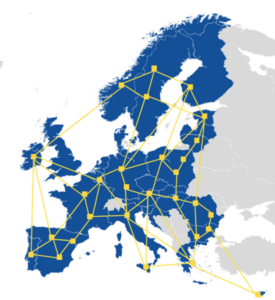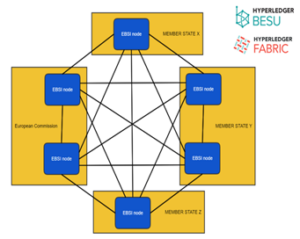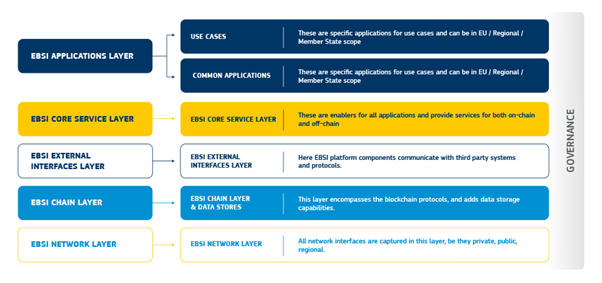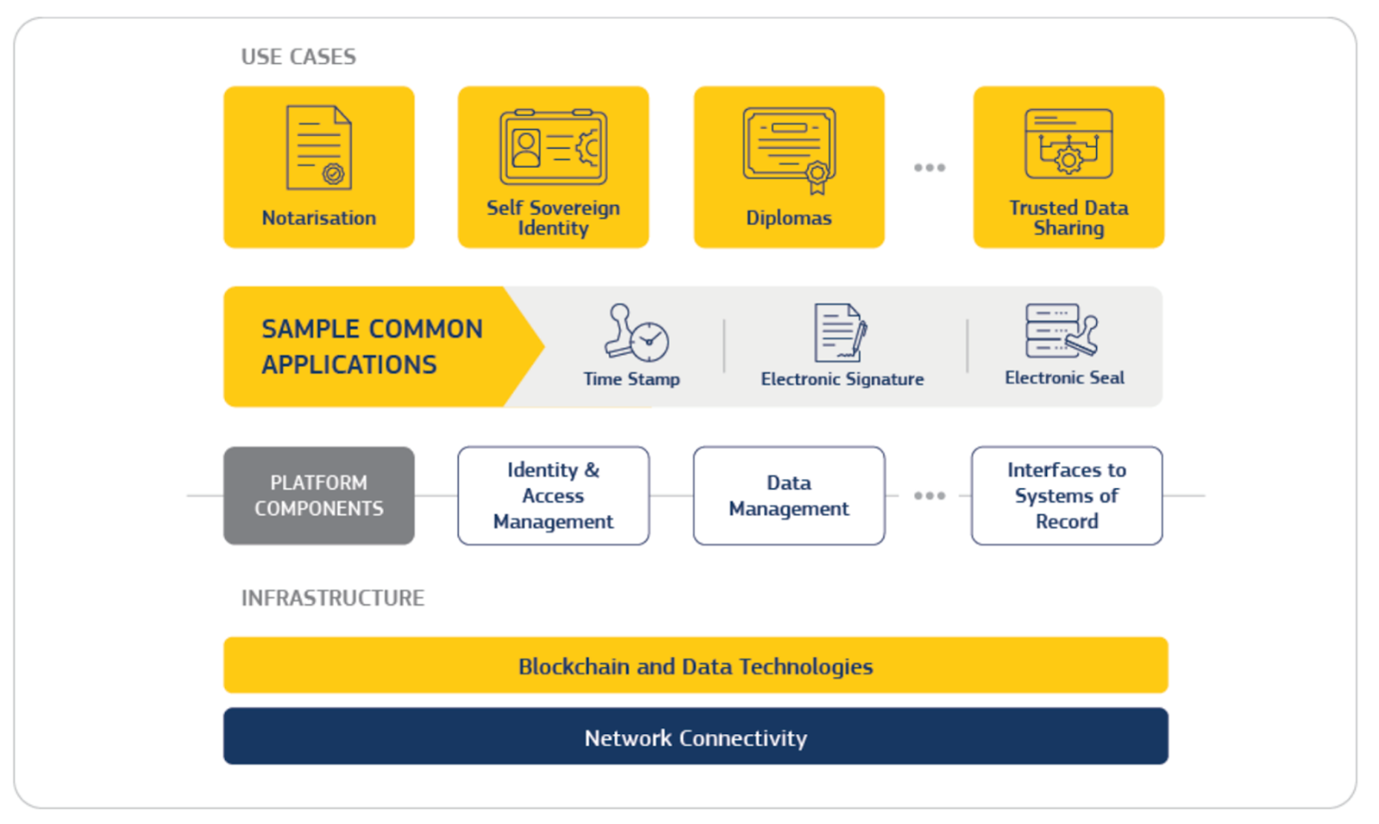About EBSI network
EBSI - European Blockchain Services Infrastructure
About EBSI?
EBSI or European Blockchain Services Infrastructure is a distributed network of nodes across Europe, based on blockchain technology, and is the cornerstone of many future implementations of digital services for the citizens of the European Union. EBSI was created as a joint initiative of the European Commission and EBP (European Blockchain Partnership), of which Slovakia also became a signatory in 2018, with the aim of providing cross-border digital services to citizens throughout the EU.
Blockchain technology has huge potential to change and especially streamline the way citizens, governments and businesses communicate and interact by developing trust between entities and improving the efficiency of operations. The EU’s ambition is to be at the forefront of pioneering a new generation of international digital services and to implement this technology in economic activities and public services across the EU as a driving force for the growth and competitiveness of the European economy.
A brief history of EBSI
The birth of the EBSI idea began in 2017 with the signing of the “Tallinn declaration on eGovernment” by EU and EFTA member states, a declaration on electronic public administration, in which the importance of efficient and secure digital public services was emphasized in order to achieve the full potential of the single digital market.
A year later in 2018, 27 EU member states, including Slovakia, Norway and Liechtenstein, signed a declaration on the creation of the European Blockchain Partnership (EBP) with the ambition to provide digital public services corresponding to the required level of digital security. On February 14, 2019, the European Commission published the work program for the “Telecommunications Work Program of the Connecting Europe Facility (CEF)”, which created the initial conditions for EBSI financing.
How EBSI works?


The EBSI platform is a network of interconnected nodes-nodes. The European Commission will operate a minimum number of EBSI nodes at European level and the Member States will operate EBSI nodes at national level. All nodes will be able to create and send transactions that create or update data in the ledger. The architecture of each node will consist of two main functional groupings of layers:
The first group of four layers containing components that together provide the EBSI infrastructure, containing common functionality for all use cases.- The second group of two layers contains case-specific components that enable support for hosting specific business applications.

European Blockchain Services Infrastructure (EBSI)
Current EBSI use cases
Four use cases were chosen for 2019 – Notarization, University diplomas, European autonomous identity and sharing of confidential data. For each use case, a working group was established under the leadership of one of the member states. The goal of these working groups is to deliver a prototype application developed on the EBSI blockchain by early 2020. The number of applications built on EBSI will continue to increase based on new use cases identified by the European Commission and Member States.
Notarisations
Harnessing the power of blockchain to create trusted digital audit trails, automate time-sensitive process compliance checks, and demonstrate data integrity.
Diplomas
Giving citizens control over the management of their education certificates. The goal is to achieve a significant reduction in verification costs and at the same time increase the credibility of the authenticity of documents.
European Self-Sovereign Identity
Implementation of a self-sovereign identity that allows users to create and control their own digital identity without relying on centralized authorities, compatible across all member states.
Trusted Data Sharing
Due to its properties, blockchain technology can be used to share data (e.g. identification numbers for VAT or import of goods) between customs and tax authorities in the European Union.

What are the benefits of EBSI? What will the future bring us?
EBSI a EU citizens
Thanks to EBSI, the use of public services should work more efficiently and safely than before. If we look at developments in the field of public services, we can clearly see that blockchain technology can reduce bureaucracy, increase the efficiency of administrative processes and increase the level of trust in the preservation of public records, which brings benefits and clear value to citizens. The goal of EBSI is not to compete in decentralization with public blockchains, but on the contrary to use the potential of this technology to improve the interoperability and efficiency of authorities in the EU member states and thereby significantly facilitate the lives of their citizens.
EBSI and European institutions
EBSI aims to simplify administrative processes, enable legal compliance and increase the efficiency of cross-border public services. In the context of eGovernment, blockchain technology has the potential to facilitate direct interactions between public institutions, citizens, or businesses. At a fundamental level, this means the improvement of public services in the processes of registration and exchange of information and, in particular, the relief from the administrative burden.
EBSI a state administration
EBSI has the potential to simplify administrative processes, increase efficiency and restore citizens’ trust in the efficiency and competence of state administration. What are the benefits of using blockchain technology in member state governments? More than a few: reducing the economic cost, time and complexity of information exchange between governments and public and private entities, improving their administrative function; reduction of bureaucracy, discretionary power and corruption caused by the use of blockchain technology and smart contracts; increased automation, transparency, controllability and responsibility for information in state registers for the benefit of citizens; increased citizen and corporate trust in government processes and record keeping using algorithms that are no longer under the exclusive control of individual governments.
Blockchain is an excellent opportunity for Europe and Member States to rethink their information systems, to promote user trust and protect personal data, to help create new business opportunities that benefit citizens, public services and Europe as a whole.